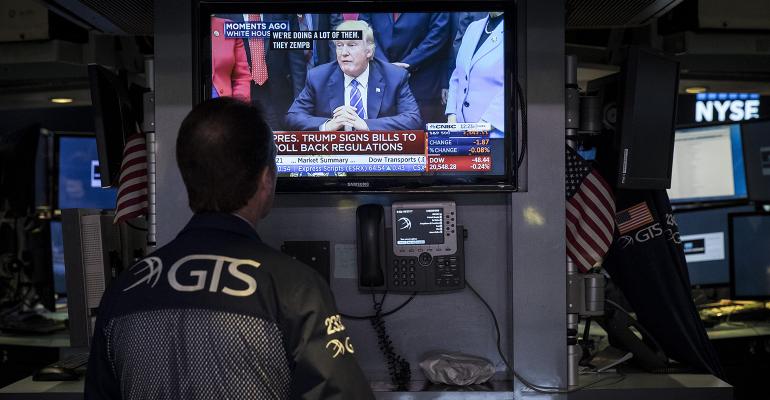By David Randall
NEW YORK, Sept 14 (Reuters) - With time running out before Congress turns its attention to the 2018 mid-term elections, small-cap stocks are increasingly acting as a bellwether for the market's expectations that the Trump Administration will reach a deal to significantly cut U.S. corporate tax rates by the end of the year.
For the moment at least, they're reflecting renewed optimism for progress on taxes after months of going no where as persistent bickering in Washington weighed on reform hopes. Small caps are seen as more sensitive to corporate tax cut expectations because, on balance, they bear a heftier relative tax burden than big companies.
Since hitting a low for the year on Aug. 21, small-cap stocks have surged 5 percent, nearly double the 3 percent gain of large-cap stocks, as President Donald Trump's team has renewed its push for a major corporate tax by the end of December.
Trump urged Congress to "move fast" on taxes in a tweet Wednesday morning, and later met with a bipartisan group of House members at the White House to discuss a tax deal. House Speaker Paul Ryan has said that an outline of a bill will be unveiled during the week of September 25.
"You've got the potential here to get a tremendous increase in earnings, and it's all up to what happens in Washington," said Craig Hodges, a co-portfolio manager of the $800 million Hodges Small Cap fund.
While businesses of all sizes would likely benefit if Congress lowers the corporate tax rate from 35 percent to 15 percent as President Trump has proposed, small companies would see the greatest improvement to their bottom lines.
Companies in the benchmark Russell 2000 of small-cap companies pay a median effective tax rate of 31.9 percent, while the larger, multi-national companies in the S&P 500 pay a median effective tax rate of 28 percent, according to Thomson Reuters data. The median for the 30 mega-cap stocks in the Dow Jones Industrial Average is just 23.8 percent.
So far, the effects of a major tax bill are not fully priced into the market, said Martin Jarzebowski, portfolio manager of the $593 million Federated Clover Small Cap Value fund, leaving the Russell 2000 sensitive to news out of Washington.
"A tax cut is more priced into small-cap growth stocks than value stocks, and that's where the opportunity lies right now," he said, adding that he has been increasing his stake in value stocks, such as airlines and local broadcasters, in part because he sees a tax deal passing.
The forward price-to-earnings ratio of the Russell 2000 Value index - a measure of companies in industries like financials and materials that traditionally pay higher taxes - has been falling and is now at 20.3, according to Thomson Reuters data. The forward price-to-earnings ratio of the Russell 2000 Growth index - a measure of companies in industries like technology and healthcare, that tend to pay lower taxes because they get more of their revenues overseas - has been rising and now stands at 32.5, close to its 10-year high.
'Trump Trade' Returns?
Small-cap stocks have largely tracked investor expectations of the Trump Administration passing business-friendly policies since his surprise victory last November.
The benchmark Russell 2000 jumped nearly 14 percent between Election Day and the end of 2016 in anticipation of lower taxes and less regulation of domestic-focused companies.
Yet that rally largely stalled over the course of 2017 as the Trump Administration failed to pass major legislation and the dollar tumbled to two and a half year lows. The Russell 2000 is up 5.1 percent for the year, less than half of the 11.5 percent gain in the large-cap S&P 500.
Sandy Villere, a co-portfolio manager of the $300 million Villere Balanced Fund, said that he saw some of the move into small-cap stocks as a sign that investors are moving into cheaper assets at a time when the S&P 500 is trading near record highs, rather than a strong signal that the tax bill will pass.
"You're just not looking at the same kind of upside in large-cap stocks right now," he said.
Terri Spath, chief investment officer at Sierra Investment Management, said she remains skeptical that a tax deal will pass. Members of the conservative House Freedom Caucus, for instance, have said that they will want deep cuts to federal spending, a move that Democrats are unlikely to agree to. Yet small-cap stocks remain cheaper relative to the S&P 500, setting the stage for a strong rally if a bill passes, she said.
"A tax bill needs the Republicans more than the Democrats," she said. "If Mitch McConnell can get the job done, or if Ms. Pelosi and Mr. Trump can break log-jams in the next few weeks, the recent rally in small stocks will have another leg up."
(Reporting by David Randall; Editing by Dan Burns and Nick Zieminski)






